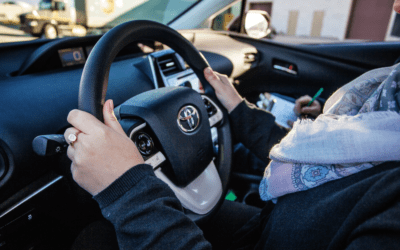During the summer, the temperature inside a closed vehicle can be lethal. If it’s 32°C outside, the temperature inside a car can go from 26-55°C in less than 15 minutes. To put this into perspective, the hottest day on record in Canada was 45°C.
Extreme summer heat can cause heat stroke in infants and small children far more quickly and dramatically than in adults —they simply aren’t able to regulate their temperature as well. According to KidsAndCars.org, which tracks hot car deaths in North America, roughly 38 kids die in hot cars every year.
It may surprise you to learn that this doesn’t just happen to careless or negligent people. It can happen to anyone. Here’s why.
How Do Hot Car Deaths Actually Happen?
Most of us are under the misconception that tragedies involving children in hot cars only happen to careless or negligent parents who aren’t aware of the danger. This is not the case; the majority of heat stroke fatalities in hot cars happen when:
- a competent but overwhelmed caregiver forgets the child is in the car, a condition known as “Forgotten Baby Syndrome”
- a child gets into an unlocked car without the driver’s knowledge and gets locked in
- a child gets into an unlocked car on their own —in a driveway, garage or elsewhere —and can’t get out
What Is “Forgotten Baby Syndrome”?
According to David Diamond, a professor of psychology at the University of South Florida in Tampa, forgetting a child is not a negligence problem but a memory problem.
Essentially, we have two types of memory: prospective memory and habit memory. Prospective memory is what we’re using when we remember to do tasks outside of our regular routine, whereas habit memory is akin to being on autopilot.
The prospective system is what fails when a driver —be it a parent, sibling or other caregiver —forgets a child in a car. The driver was simply on autopilot, but the consequences can be complex and long-lasting, such as the case of Chase Dmitri Harrison, whose tragic death in 2008 triggered an adoption ban in the U.S.
How Can New Drivers Prevent Tragedies Involving Kids In Hot Cars?
Vehicular heat stroke deaths are preventable. All drivers, especially new drivers with children or young siblings at home —that is, drivers who have yet to develop safe summer driving habits —should do the following to prevent child fatalities in hot cars:
- Look before you lock —don’t assume the car is childfree even if it should be!
- Keep something you need for your day in the backseat.
- Put something that will remind you there’s a child in the backseat in the front seat (a toy, a diaper bag, etc).
- Always lock all doors to prevent children from entering the car when you’re not around.
- Keep car keys and fobs out of reach of children.
- If you see a child alone in a car, call the police. Don’t assume the driver knows the child is in there and will be back “at any moment”.
Above all, don’t assume it could never happen to you. Visit the DriveWise Blog for more summer driving tips for new drivers.
Find out why DriveWise is Canada’s leader in driver education safety training. For more information about our programming and how we can help you become a safe and skilled driver, give us a call at 1-705-730-1130 or reach out to one of our representatives through our online contact form or chat window.




